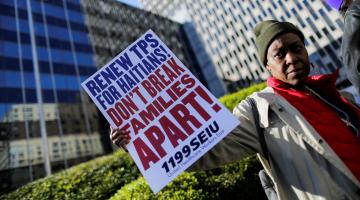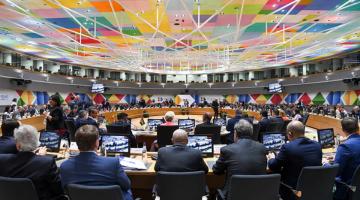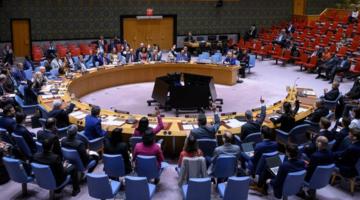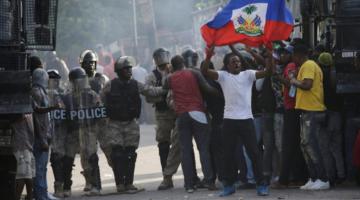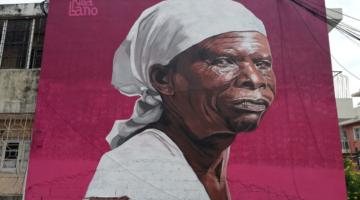On the 220th anniversary of Haitian independence, we reprint the speech given at the first Solidarity Conference of the Peoples of Africa, Asia, and Latin America by Haitian revolutionary, Paul Lantimo.
From January 3 to 16th, 1966, some five hundred delegates from eighty-two countries gathered in the Chaplin Theatre in Havana, Cuba for the first Solidarity Conference of the Peoples of Africa, Asia, and Latin America. A more militant extension of the famous Asian-African conference held in Bandung, Indonesia a decade before, the Havana meeting was initiated by Algeria’s prime minister Ahmed Ben Bella and Moroccan revolutionary Medhi Ben Barka. Bella, however, was deposed and imprisoned before organizing began, and months prior to the start of the conference, Ben Barka was abducted on the streets of Paris and tortured and killed. Yet the conference went forward. It was attended by representatives from trade unions, internationalist organizations, political parties, and liberation factions from Puerto Rico to Palestine, and by individuals including Fidel Castro and Haydee Santamaria of Cuba, Guyana’s Cheddi Jagan, Chile’s Salvador Allende, Angola’s Marcelino dos Santos, George Weeks of Trinidad, and Amilcar Cabral of Guinea Bissau, who delivered his famous speech “The Weapon of Theory.” Che Guevara was elected honorary chairperson, in absentia. The Havana conference served as the founding meeting of the Organization of Solidarity with the People of Asia, Africa and Latin America (OSPAAAL) and, inspired by both the examples of Cuba and Vietnam, the conference resolutions emphasized armed revolutionary struggle and against imperialism, colonialism, and neocolonialism.
Haiti was represented in Havana by the Front démocratique unifié de libération nationale, the Unified Democratic Front of National Liberation (F.D.U.L.N). The F.D.U.L.N was an anti-imperialist and anti-feudal organization founded in 1964. It was formed through the merger of the Parti d’Union de Democrates Haitiens and the Parti d’Entente Populaire, two radical Haitian groups who had found common cause in their attempts to overthrow the US-supported dictatorship of François Duvalier. F.D.U.L.N chairperson Paul Lantimo addressed the conference. Lantimo’s speech, “Haiti: A Black Revolution will Repeat Itself,” given in the name of the Haitian people, provided an illuminating analysis of Haiti’s plight since the success of the Haitian Revolution in 1804. Lantimo explained how nearly two centuries of imperialist intervention and neocolonial control have undermined Haitian development, while the Haitian state (in this case, under Duvalier), was mobilized against the Haitian people, be they peasants and the working class or bourgeois intellectuals and merchants. For Lantimo, Haiti’s hope was in its history of revolutionary success, and in solidarity across class boundaries and national borders, against a global common enemy: imperialism.
A translation of Latimo’s talk was published in the summer 1966 issue of Soul Book: The Quarterly Journal of Revolutionary Afroamerica, in Berkeley, California by a branch of the Revolutionary Action Movement. We reprint the talk below to mark two anniversaries in Haiti. The first, January 1st, 2024, is the two-hundred and twentieth anniversary of the Haitian revolution and the birth of the first Black republic in the world. The second anniversary, also in 2024, acknowledges a more sordid occasion: the twenty-year anniversary a new era of imperialist neocolonialism in Haiti, one that is often called the “second occupation.” During the first occupation of Haiti, from 1915-1934, US marines landed in the republic and took over all of Haiti’s political and economic institutions, while massacring any Haitian that stood in their way. The second occupation began in 2004 and was initiated by the U.S., Canada, and France, but given cover by the United Nations and a multinational military force. It began with the abduction and exile by U.S. marines of Jean Bertrand Aristide, Haiti’s first democratically-elected president. It continued with the usurping of Haiti’s popular democracy by the Core Group, a cabal of nations and multinational entities who both control Haiti’s economy, and pull the strings controlling the limbs of Haiti’s puppet leaders, including the unelected and unpopular prime minister Ariel Henry.
Soon, the second occupation will intensify with the landing of foreign militaries - ostensibly led by the neocolonial state of Kenya - to “pacify” Haiti’s restless masses. We can be certain, however, that Lantimo’s prediction in Havana in 1966 will come true: in Haiti, a Black revolution against imperialism will repeat itself.
Haiti: A Black Revolution will Repeat Itself
Paul Lantimo
Brother Delegates of the countries of Asia, Africa, and Latin America: In the name of the oppressed people of Haiti, the delegation from the United Democratic Front of National Liberation warmly salutes the peoples of the countries of Asia, Africa, and Latin America that are struggling against international imperialism for the sake of economic and political independence, social progress and peace. The Front transmits its message of vivid encouragement to the people of Congo([Leopoldville]), South Africa, the peoples of Colombia, Venezuela, Peru, Guatemala and Laos, who struggle heroically against imperialism and the retrograde governments of their respective countries. The Haitian delegation sends a special greeting to the Dominican people and assures them of the complete solidarity of the Haitian people in their struggle against the Yankee troops. Finally, admiration is expressed for the valiant people of Vietnam who at this moment deal serious blows to imperialism and its lackeys. By landing numerous troops in Vietnam and intimidating the people American imperialism thought that the situation would be placed in their favor. Mr. Johnson and the pentagon militarists were grossly mistaken. In Vietnam it is the people that have the initiative – Northamerican imperialism will be crushed sooner or later. Today, confronted with the willful intensification of imperialist aggression the delegates of the progressive and revolutionary movements of Asia, Africa and Latin America are reunited so that conditions for decisive response from all the peoples may be planned. Oh, how the imperialists tremble!
Brother Delegates: the people of our country have already lived in the memory of revolutionary feats. In 1791, under the leadership of Toussaint Louverture and Jean Jacques Dessalines, and utilizing intercolonialists’ rivalries, the French slave yoke was broken, the war of independence was victoriously sustained, and the napoleonic armies were thrown out of the country. This was in 1804.
But in the conditions of that epoch in which growing international capitalism leaned upon the colonial slavery in Africa and America (and thus determined the future of humanity), it was extremely difficult for a small country to develop an independent economy. The capitalist countries imposed upon us a sort of economic blockade, and refused us credit and technical equipment so vital to us after a dozen years of devastating war. Leaning upon the military chiefs and the enormous import-export commerce in foreign hands, they succeeded in making our country into a semicolony, thus condemning the Haitian masses to misery.
This situation became worse in the first part of the century. Yankee imperialism, taking advantage of the rivalries between the European powers following the first world wars, sent their marines to our territory and occupied our country for 15 years (1915 - 1930). The American imperialists utilized their presence in our country to outstrip their English, German, and above all, French rivals. They directly controlled our banks and our finances. They established a custom house management that bequeathed the foreign trade to their monopolies, they installed a judicial system according to their fancy, and an administration and military that permitted them to control the economic and political life of our country, which continued after their departure. They imposed on us the purchase of their oil and their coffee prices; they expropriated our peasants in the Northeast, in the Artibonite Valley, and the West for the installation and working of their sugar and sisal refineries, and for the extraction of copper and bauxite, which instead of being processed in the country, is exported to the U.S. By robbing us of our mineral riches and ferociously exploiting the labor of our people, imposing their trade and their prices, Northamerican domination succeeding aggravating and accelerating the internal crisis of the regime.
Northamerican imperialism ended its occupation of Haiti in 1930 [1934, actually, Eds.]. But it has left behind itself its slaughterhouses and a system conforming to its interests. The government of Duvalier is its present representative and faithful servant.
Put into power by the Haitian army with the benediction of the State Department, Duvalier has not ceased to maintain for it an internal and external reactionary policy. He has supported and maintained: a free rein for the investments of imperialist capital; sabotage of the national effort in economy, fiscal policy that crushes agricultural producers, starving the mass of workers and middle classes; intolerance and persecution of syndical and democratic organizations leaving the oppressed classes to the mercy of their masters, the feudal lords and the state; total support for U.S. foreign policy; notorious support to the imperialist intervention of the Congo, Northamerican intervention in the Dominican Republic, and to the policy of U.S. hostility against Cuba.
But Northamerican imperialism and its flunky Duvaliers cannot maintain domination of our people much longer. Already there have been outward signs of a crisis. The phenomenon of the insolvency of state has reappeared in dramatic manner: entire ranks of public employees and employers do not receive their semi-monthly, and monthly salaries and/or they collect it with great delay – this situation places them in the hands of usurers. Certain enterprises of production controlled by the state (essential oil factories nationalized in 1959, central confectioner of Cayes) are in constant deficit. The morality and state credit is bankrupt; the national, secondary and university teaching have lost their prestige because of the meddling of the "tonton-macoutes" (armed civil agents, members of Duvaliers repressive police) among professors, who in part are provoked into departing for Canada or Africa (on the other hand harm done to the low-income citizens provokes and increases the prestige of private schools). In the custom houses and post offices pillages of foreign packages have been organized with the immense anger of citizens and especially businessmen. Justice has entirely disappeared.
All conflicts are settled under the [??????????] pressure of a “ton ton macoute,” who heap abuses on all classes. The political prisoners are executed or else they rot in prison, completely cut off from the outside. An unimaginable terror is thrown down over the cities and countryside. The families of Benoit Riobe a P-au-P, Sansarick a Jeremie and many others were assassinated in broad daylight because of police denunciation and without any other foundation. On the border (Dominican-Haitian) areas hundreds and hundreds of peasants were machine-gunned and thrown to the pit and graves simply for having sold or supplied the Haitian rebels with food who fought in the mountains at that time. In short all levels of political and military authority are controlled by sinister persons, who owe no allegiance to any class, and who are ready to complete, if it is ordered of them, all the sorrowful tasks, and in case of necessity commit the most dishonest and cruel acts. The Haitian crisis thus became more visible, clear for all the world to see. But this was worse, because now a principal, decisive sphere of action has to be passed, the power sphere of the reactionary classes. The state is discovered to be incapable of satisfying the appropriate elementary obligations to the classes that sustain it. Their debts are inflated indefinitely to the detriment of the bank, or some big businessmen, and certain imperialist companies. And now it (the state) is faced with the necessity of utilizing extraordinary methods of taxation that are simply exigences of investment of this or that sum of money or opportunity. Thus, more and more the machinery of the state functions in the interest of one reactionary group against another. From that results an aggravation of the contradictions inside the exploited classes. It becomes vital for each group to directly take over the state machinery for themselves. In the long electoral campaign that was ferociously fought between the different traditional political sectors, the winning Duvalierist gangs used the state machinery not only against the people -- which was to be expected--but also against the other gangs of reaction. Public liberties do not even exist.
In summary: the incredible misery of the working masses, the weakness of the regime as a result of the hostility between the different reactionary gangs, the blind and ferocious repression and disappearance of all liberties for the people has created a new situation that permits new forces to advance steadily in the country.
The Duvalier Government did not fall from the sky. It is the expression of the crisis of the regime and of world imperialism. Because the reactionary classes have been and always will be impotent in solving crisis, only the revolutionary action of the people will be sufficient to change the situation.
Up to now the Haitian masses have developed combat under different forms. The workers, students, and professionals have sustained important syndical and political battles despite the repression. During 1961 students organized a powerful strike which took an immediate political character and endangered the power of Duvalier. The peasants have often undertaken violent manifestations in order to defend themselves against the expropriation or the abuses of the "ton-ton macoutes." Likewise, on three or four occasions groups of patriots took the initiative of armed action that failed because of the authors' political inexperience and their isolation from the people.
The new opposition constantly organizes itself on a superior level: it supports portions of the vanguard, it does not yet entrust to itself the Role of Liberators, it works together on the basis of a program or any way on the basis of ideas; it turns its back on the past and looks toward the future, condemning the imperialists, the big businessmen and the feudal lords; it desires to lean upon the masses, to conscientiously support and guide them in assault: for these reasons this front has been established– the United Democratic Front of National Liberation.
It is a front which agrees to solve the present revolutionary situation. Our work is to unify the action of all Haitian revolutionaries and put an end to the division within our ranks in order to lead the masses in armed struggle against Duvalierism. We are convinced of the future demolition of the Duvalierists (by the popular forces), the bulwark of imperialist domination in Haiti. The popular forces will lead radical change in the structure of the regime and will strike a strong blow against imperialism.
The demolition of Duvalierism and the regime which sustains it constitute our particular contribution to the struggle of the peoples of Santo Domingo and of Vietnam, to struggles of the peoples of the world against international imperialism, against Northamerican imperialism. Brother Delegates: when the Northamerican imperialists occupied our country the Haitian people heroically resisted Yankee aggression. Our valiant peasants under the leadership of Charlemagne Peralta [Peralte] and Benoit Batraville entrenched themselves in the mountains and molested the U. S. Military. But due to lack of a revolutionary vanguard and isolation from other countries they were eventually annihilated, and their leader Charlemagne Peralta was captured then shot after being appended to a wooden cross. Since then the times have changed. On Dominican soil and in Haiti determined and shining vanguards work in order to unite both peoples against their principal enemy -- U. S. imperialism. Besides, the socialist countries and revolutionary movements of other countries are determined to aid our two peoples. Imperialism cannot take action on their whim. Recently, U. S. imperialism disembarked troops in Santo Domingo, but it is incapable of imposing its peace; it is incapable of dominating the popular resistance. The Dominican people will conquer U. S. imperialism.
The Northamerican imperialists have cynically affirmed, since the events of Santo Domingo, their will and right to land their troops were they please.
But the Haitian and Dominican peoples learn their lesson of history. And now on Dominican territory workers and patriots have begun to get along with the people that struggle against Northamerican imperialism.
The Haitian and Dominican peoples under their respective vanguards and leaning upon Brother peoples are obliged to cooperate and they will cooperate in order to make the imperialists pay dearly for the humiliations of yesterday and today. They must wage a long and difficult struggle. But closely united with and aided by Brother peoples, they will fling the Northamerican imperialists into the sea and annihilate, internally, the puppets that support yankee imperialism.
Brother Delegates: the Haitian people must meet above all else the battle against Northamerican imperialism. But we are jointly liable with the struggle of all the peoples against the other imperialists and we want to extend our hands especially to the West Indian people who struggle against French, British, and Dutch imperialism. Since all the imperialist[s] have an understanding amongst themselves to maintain their colonies in the Caribbean, the Caribbean people must unify their action against international imperialism headed by the U.S.A. We propose that the Tricontinental Conference should adopt a practical resolution with that perspective. Equally, as they come to their accursed agreement on their passing divergences on less essential questions, they are determined to smother the peoples' struggle for social progress, peace and socialism. It is in response to this that the peoples of Asia, Africa, and Latin America united in common action against international imperialism. Because of that we desire that the Tricontinental Conference make a resolution by which to establish a permanent organization to coordinate the struggle of the peoples of Africa, Asia, and Latin America.
DOWN WITH THE IMPERIALISTS!
LONG LIVE THE WEST INDIAN PEOPLES!
LONG LIVE THE PEOPLES OF AFRICA, ASIA, AND LATIN AMERICA!
(This is the translation (by Soul Book) from the Spanish text of a speech given in French at the recent Afro-Asian Latin American Conference.)
Paul Lantimo, “Haiti: A Black Revolution will Repeat Itself,” Soul Book: The Quarterly Journal of Revolutionary Afroamerica 5 ( Summer, 1966). Digital copy available at The Freedom Archives.

